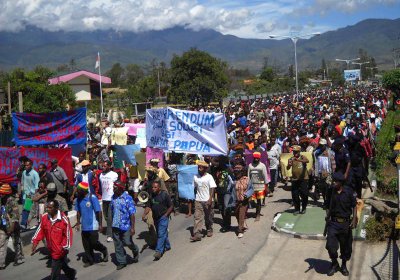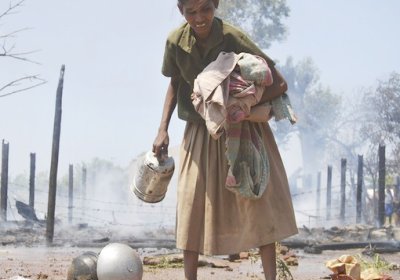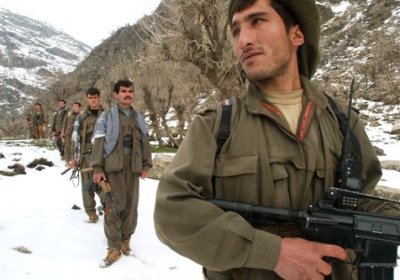Thousands of republicans from across Ireland gathered on July 20 in Sallins, County Kildare, to honour Theobald Wolfe Tone, known as “the father of Irish republicanism”. Tone led an uprising against British rule and for an Irish republic in 1798. When it was defeated, Tone was sentenced to death.
National liberation
A unprecedented mass demonstration took place on July 8 in Jayapura, the capital of Indonesian-occupied West Papua, Straighttimes.com said that day.
Thousands of people joined a long march, walking 17 kilometres from the Papua People’s Assembly (MRP) to the Papuan Provincial Legislature (DPRP) to reject the “special autonomy” granted by Indonesia in 2001. Protesters demanded a referendum on West Papuan independence and an internationally-mediated dialogue with Jakarta.
Up to 1.5 million people flooded the streets of Barcelona on July 10 in an enormous demonstration behind a lead banner proclaiming: “We are a nation, we decide.” The turnout exceeded the most optimistic forecasts.
Even the most conservative and Spanish-nationalist media admitted this huge protest against the constitutional court’s undermining of Catalonia’s Statute of Autonomy was one of the biggest since the end of the Franco dictatorship in 1975 — and the most important in the history of Catalan nationalism.
On April 9, the Australian Labor Party government, then led by Kevin Rudd, imposed a three-month suspension of the processing of refugees from Sri Lanka. On July 6, the Labor government of PM Julia Gillard announced, in the context of unveiling its pre-election tougher stance against refugees, that the suspension would not be extended.
The proposal for a visit to the 26 Irish counties that make up the southern state by the British head of state, Queen Elizabeth II, has drawn condemnation from Irish republicans.
Irish Taoiseach (head of government) Brian Cowan announced in June plans for a royal visit, believed to be for sometime in 2011. It would be the first visit by the British head of state to the southern Irish state since it was founded in 1921.
Step by Step: Women of East Timor, Stories of Resistance and Survival
Edited by Jude Conway
Charles Darwin University Press, 2010
241 pages, $44
Review by Niko Leka
The title of Step by Step refers to how the Timorese gained their independence. The steps are told through the firsthand narratives of 13 women who grew up in East Timor.
When they were born it was a Portuguese colony, which in 1975 was invaded and occupied by Indonesia. It achieved victory in the quarter century-long struggle for independence in 1999.
Hundreds of activists in Washington, DC demonstrated on July 6 outside the White House to protest against Israeli Prime Minister Benjamin Netanyahu’s visit.
Protesters held signs calling on the US government to end military aid to Israel as Netanhayu met US President Barack Obama.
After the meeting, Obama said: “I think the Israeli government, working through layers of various governmental entities and jurisdictions, has shown restraint over the last several months that I think has been conducive to the prospects of us getting into direct talks.”
Leichhardt Friends of Hebron can be very proud of the Festival of Friendship for Hebron it held over June 25-26.
The event raised more than $5000 for a kindergarten in the impoverished village of Um al Khair in the South Hebron hills. It also won a significant political victory over the ban the previous Leichhardt Council administration placed on a Palestinian photo exhibition two years earlier.
The following statement was released on June 27 by the group Palestinian Queers for BDS (boycott, divestment and sanctions – an international campaign to isolate Israel in protest against its treatment of Palestinians). Support for the BDS campaign has grown significantly since Israel’s massacre of peace activists on a boat taking aid to Gaza on May 31.
* * *
Palestinian Queers for BDS call upon all queer groups, organisations and individuals around the world to boycott the apartheid state of Israel.
On June 1, the Kurdish Workers Party (PKK) announced an end to its 13-month unilateral ceasefire. Since 1984, the PKK has waged an armed struggle against the Turkish state for Kurdish self-determination.
A day earlier, imprisoned PKK leader Abdullah Ocalan announced that he was withdrawing from negotiations. He cited a disconnect between the Turkish government’s promised reforms and continued violent repression of Turkey’s Kurdish population.
The statement below was released by Asian left groups on June 25. To add your organisation’s name, email international@socialist-alliance.org.
* * *
Israel stands increasingly isolated after its manufactured confrontation on May 31, 2010, with the peace flotilla, in which nine Turkish activists on the Mavi Marmara were murdered. So now is the time to increase the pressure on Israel to lift the siege of Gaza.
Seven oxygen machines donated to the Palestinian Authority by a Norwegian development agency were seized by Israeli officials, Ma’an news agency said on June 25. The Ramallah-based PA health ministry said the machines were en route to hospitals in Gaza and the West Bank.
The ministry said in a June 24 statement that Israeli officials confiscated the machines, claiming the generators attached “came under the category of possible use for non-medical purposes” if they were delivered to Gaza.
- Previous page
- Page 129
- Next page








